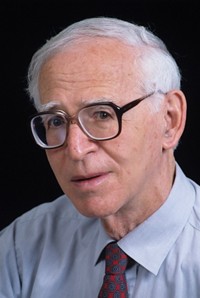Advertisement
Grab your lab coat. Let's get started
Welcome!
Welcome!
Create an account below to get 6 C&EN articles per month, receive newsletters and more - all free.
It seems this is your first time logging in online. Please enter the following information to continue.
As an ACS member you automatically get access to this site. All we need is few more details to create your reading experience.
Not you? Sign in with a different account.
Not you? Sign in with a different account.
ERROR 1
ERROR 1
ERROR 2
ERROR 2
ERROR 2
ERROR 2
ERROR 2
Password and Confirm password must match.
If you have an ACS member number, please enter it here so we can link this account to your membership. (optional)
ERROR 2
ACS values your privacy. By submitting your information, you are gaining access to C&EN and subscribing to our weekly newsletter. We use the information you provide to make your reading experience better, and we will never sell your data to third party members.
People
Daniel Koshland Dies At 87
Former Science editor and biology professor promoted biochemistry frontiers
by Susan J. Ainsworth
July 30, 2007
| A version of this story appeared in
Volume 85, Issue 31
Renowned biochemist Daniel E. Koshland Jr., a champion of biological sciences at the University of California, Berkeley, died on July 23 after a massive stroke. He was 87.
Serving as editor of Science from 1985 until 1995, Koshland took on the role of scientific statesman while transforming the journal into a primary voice of science in the U.S.
A longtime professor of molecular and cell biology at UC Berkeley, "he applied his deep knowledge of chemistry to serious issues in biology," notes David Baltimore, a Nobel Laureate and professor of biology and president emeritus at California Institute of Technology. "His concept of induced fit of enzymes was one of the key notions about protein movement. His later work on chemotaxis was very important and insightful."
Working with Koshland as a student and later as a faculty colleague "was a pleasure because he was always upbeat, inspirational, fair-minded, and considerate," says Robert Tjian, a professor of molecular and cell biology at UC Berkeley. "He was a master at getting others to see the logic of his vision and, ultimately, to support his endeavors to improve research and teaching here."
In the 1980s, Koshland spearheaded an ambitious reorganization of biology at UC Berkeley to reflect new trends in the field, including the emergence of recombinant DNA and a focus on gene and protein interactions.
Koshland was the son of Daniel E. Koshland Sr., a banker who joined Levi Strauss & Co. in 1922 and eventually became the company's president and chairman of the board. Koshland Jr., following in the footsteps of his father and grandfather, enrolled at UC Berkeley and graduated in 1941 with a B.S. in chemistry. He immediately joined the Manhattan Project group headed by Glenn T. Seaborg to isolate plutonium for an atomic bomb. He followed Seaborg to the University of Chicago, where he completed a Ph.D. in organic chemistry in 1949.
After two postdoctoral years at Harvard University, Koshland moved to Long Island, N.Y., to work at Brookhaven National Laboratory until 1965, when he was recruited by UC Berkeley. He also had a joint appointment at Rockefeller University, in New York City, from 1958 until 1965.
In recent years, Koshland provided leadership for UC Berkeley's $400 million Health Sciences Initiative. He gave generously to the campus, including money for construction of the Marian Koshland Bioscience & Natural Resources Library, which is named for his first wife, a UC Berkeley professor of molecular and cell biology, who died in 1997. He also provided a major gift to endow the Marian Koshland Science Museum of the National Academy of Sciences, in Washington, D.C.
Koshland was a recipient of many awards, including the Edgar Fahs Smith and Linus Pauling Awards of the American Chemical Society in 1979, the Merck Award from the American Society of Biochemistry & Molecular Biology in 1990, the National Medal of Science in 1990, a Lasker Award for Special Achievement in Medical Science in 1998, and the Welch Award in Chemistry in 2006.
He was a member of the National Academy of Sciences and the American Academy of Arts & Sciences, and he served on the councils of both societies. He also served as president of the American Society of Biological Chemists. He was an emeritus member of ACS, joining in 1940.
Koshland is survived by his wife, Yvonne; two sons; three daughters; three step-children; nine grandchildren; one great-granddaughter; 12 step-grandchildren; and 17 step-great-grandchildren.




Join the conversation
Contact the reporter
Submit a Letter to the Editor for publication
Engage with us on Twitter